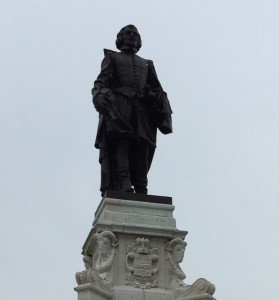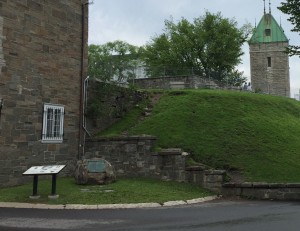I’m delighted to have visited Québec, a city at a pivotal geographic and historic place. I’m told it’s the oldest established city in North America. Well, Jacques Cartier planted a cross in the Gaspé Peninsula in 1534, claiming the land in the name of King Francis I. But although French fishing fleets sailed to the Atlantic coast and into the St. Lawrence River, making alliances with native Americans, it wasn’t really until Samuel de Champlain’s expedition in 1603 that formal exploration started. In 1608, he founded a trading post by the Saint-Laurent river (the future Québec City) with the intention of making the area part of the French colonial empire – “la Nouvelle France”.
We’ve only dipped into the history briefly during our visit, walking the Plains of Abraham where British General Wolfe defeated the Marquis de Montcalm in 1759, and the fortifications and walls defended by General Carleton against the American expeditionary force in 1775 led by General Richard Montgomery and a certain General Benedict Arnold.
In 1812, Thomas Jefferson famously wrote to William Duane in August 1812 “The acquisition of Canada this year, as far as the neighborhood of Quebec, will be a mere matter of marching; & will give us experience for the attack of Halifax the next, & the final expulsion of England from the American continent.”
Well, that didn’t work.
Just from talking to history buffs (and normal people!) here in Canada, I gather the war of 1812, which actually went on until 1814, is considered hugely significant in the nation’s history; the incursion from the south wasn’t welcome to the mixture of former American Loyalists, new settlers and many French Canadians.
I dug a little deeper and found “The War of 1812”, a Canadian history site produced jointly by the Historica Dominion Institute, the Royal Canadian Geographic Society and Parks Canada.
‘Washington had expected the largely American population of Upper Canada to throw off the “British yoke” as soon as its army crossed the border. This did not happen. Lured northwards by free land and low taxes, the settlers wanted to be left alone. Thus the British and Loyalist elite were able to set Canadians on a different course from that of their former enemy. And the growing belief that they, the civilian soldiers, and not the First Nations and British regulars, had won the war – more mythic than real – helped to germinate the seeds of nationalism in the Canadas.
Canada owes its present shape to negotiations that grew out of the peace, while the war itself – or the myths created by the war – gave Canadians their first sense of community and laid the foundation for their future nationhood. To this extent the Canadians were the real winners of the War of 1812.’
Interesting how different people see the same event…
Alison Morton is the author of Roma Nova thrillers, INCEPTIO, PERFIDITAS and SUCCESSIO. The fourth book, AURELIA, is now out.
Find out more about Roma Nova, its origins, stories and heroines…














